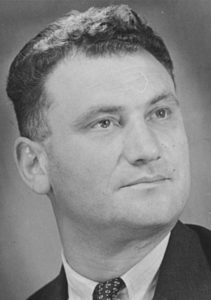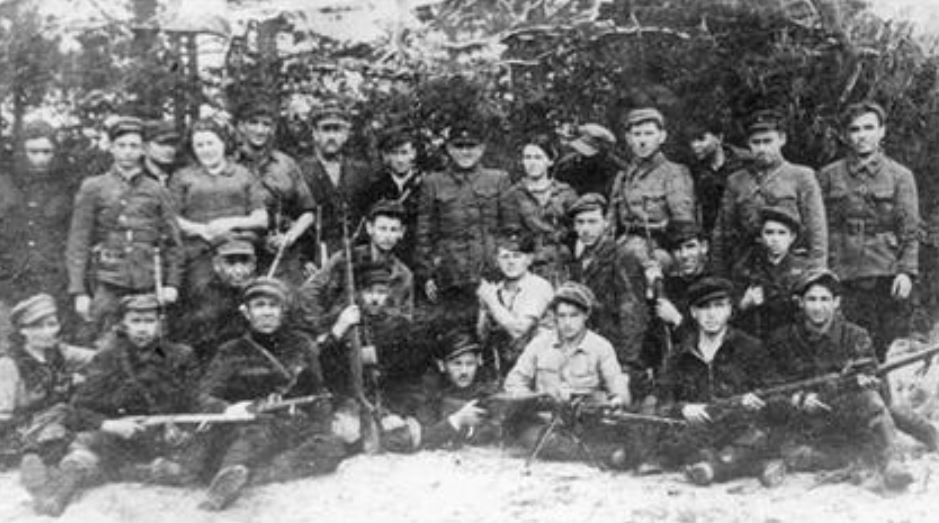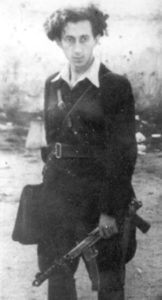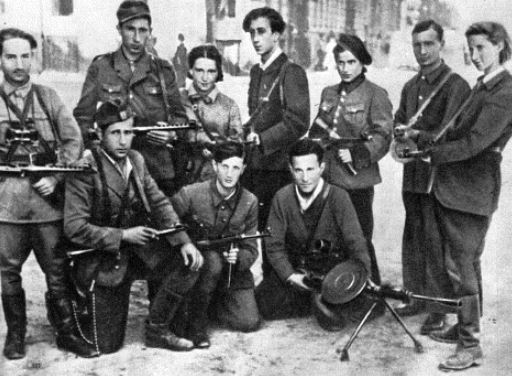The Jewish Avengers

Tuvia Bielski
Tuvia Bielski (1906-1987) was born in a small village near what is today Navahrudak, Belarus (then part of the Russian Empire). When the German Army occupied the area during World War I, he was called to work for them as an interpreter, since he knew Polish, Russian and Yiddish. After the war, his hometown reverted to Polish rule, and Bielski was drafted to the Polish Army. He finished his service with the rank of corporal, then returned home to work in the family grain mill. When Nazi Germany invaded in 1939, Bielski was called up to fight. His cousin Yehuda Bielski (1909-1994), who had served as an officer in the Polish Army, was called up, too, and was shot in the leg. When SS troops stormed his hospital, he managed to escape. The Poles surrendered shortly after and the Bielski cousins returned to their village. The Nazis arrived there in the summer of 1941 and forced all the Jews into the Navahrudak ghetto. Tuvia, his sister, and three brothers fled to the Naliboki Forest; their parents, and two other brothers, were killed in the ghetto. The wife and baby daughter of his brother, Alexander “Zus” Bielski (1912-1995), were killed as well. In the forest, the Bielski brothers and 13 friends formed a paramilitary group under the command of Tuvia and brother Asael Bielski (1908-1945), launching a guerrilla war campaign against the Nazis. Through a Christian friend, they got a letter out to cousin Yehuda to join them and share his military expertise, which he did after escaping the ghetto.
The Bielski Partisans quickly grew to a force of about 150 fighters, and freed over 1200 Jews (including Jared Kushner’s grandmother) from the ghetto and surrounding villages. They worked to sabotage Nazi plans, destroying 4 bridges, 23 train cars, 32 telegraph lines, and killing nearly 400 soldiers. Their primarily goal, however, was to save lives. (Tuvia’s motto: “I would rather save one old Jewish woman than kill ten German soldiers.”) The Bielski Partisans built their entire life in the forest, constructing a school and hospital, bathhouse, bakery, tannery, synagogue, and even a courthouse and jail. The place became known as “Forest Jerusalem”. It had 125 full-time workers who also supplied the Soviet Army and other partisan forces in the area. The Nazis soon placed a 100,000 Reichsmark reward for the capture of Tuvia, and in August of 1943 launched a huge operation in the Naliboki Forest. While they were unable to suppress the Bielskis, they damaged most of their infrastructure, and punished many surrounding villages. The Bielskis ultimately joined forces with the Soviets and helped drive the Nazis out. (Throughout this time, they kept the identity of Yehuda secret, since the Soviets considered Polish officers to be enemies, and would have executed him immediately.) After the region was liberated in the summer of 1944, the Soviets turned on the Bielskis and the brothers fled. Unable to escape, Asael was conscripted to the Soviet Army and died in the Battle of Konigsberg in 1945. Tuvia and Zus, along with younger brother Aron Bielski (b. 1927)—who was only 12 when the war started—made their way to Israel and fought in the new state’s Independence War. Yehuda Bielski was there, too, and was injured in battle yet again. He rose to the rank of lieutenant in the IDF. The Bielskis eventually settled in New York, where they built a successful transportation company with a fleet of taxis and trucks. The story of the Bielski brothers was featured in two books, and a Hollywood film, Defiance, starring Daniel Craig as Tuvia.
Words of the Week
It’s the small acts that you do on a daily basis that turn two people from a “you and I” into an “us”.
– Rabbi Menachem Mendel Schneerson (1902-1994), the Lubavitcher Rebbe

The Bielski Partisans in the Naliboki Forest

 Abel “Abba” Kovner (1918-1987) was born in what is today Belarus and grew up in Vilnius (then part of Poland). As a young man, he was a member of HaShomer HaTzair, the Zionist youth movement. When the Nazis invaded Vilnius in 1941, Kovner escaped to a convent, but soon returned to the Vilna Ghetto to organize a Jewish resistance. At the start of 1942, Kovner secretly published a manifesto inside the Ghetto to inspire the Jews to fight back, writing that it was better to die than “go like lambs to the slaughter”. Along with several other young men, Kovner formed the United Partisan Organization, possibly the first armed underground Jewish group in Nazi Europe. Before they could launch their first large-scale attack, the Vilna Ghetto was liquidated in 1943, forcing the group to flee to the surrounding forests. From there, they launched a guerrilla warfare campaign against the Nazis. The small group began calling themselves “the Avengers” (HaNokmim) and were successful enough to draw the attention of the Red Army. They would go on to coordinate with the Soviets to crush the Nazis in Eastern Europe. Once the fate of the Nazis was sealed towards the end of 1944, Kovner was among the founders of a new group, called Bricha (“Escape”), which worked to get Jewish refugees out of Europe and to the Holy Land. Over the next couple of years, they would successfully move 250,000 Holocaust survivors to Israel. Having seen first-hand the horrific devastation inflicted by the Nazis, Kovner yearned for revenge. He started yet another group, called Nakam (“Vengeance”), seeking to punish Germany for the Holocaust. “Plan B” was to poison the water supply in Allied prisoner-of-war camps where Nazi SS soldiers were kept. The far more controversial and shocking “Plan A” was to poison the water supplies of several major German cities in order to kill 6 million Germans, one for each Jew lost in the Holocaust. Thankfully, Plan A was soon abandoned, though Kovner was still arrested by the British and held in a Cairo prison for several months. He did aim to accomplish Plan B, and Nakam members infiltrated a POW camp bakery in April 1946, coating the loaves of bread with arsenic. Over two thousands German soldiers fell ill, though no deaths were reported. In December 1947, Kovner joined the Haganah and fought in Israel’s Independence War as a captain of the Givati Brigade. Following this, he lived out the remainder of his life in a kibbutz, working tirelessly to strengthen the nascent state. He also helped to design several Holocaust museums, and testified at the Eichmann trial. More famously, Kovner wrote a series of poetry books (in Hebrew and Yiddish) describing the struggles he faced during the Holocaust and in Israel’s early years. This made him one of the country’s most celebrated poets and writers. For this, he won the Israeli Prize for Literature in 1970. A heavy smoker, Kovner succumbed to tracheal cancer before his 70th birthday.
Abel “Abba” Kovner (1918-1987) was born in what is today Belarus and grew up in Vilnius (then part of Poland). As a young man, he was a member of HaShomer HaTzair, the Zionist youth movement. When the Nazis invaded Vilnius in 1941, Kovner escaped to a convent, but soon returned to the Vilna Ghetto to organize a Jewish resistance. At the start of 1942, Kovner secretly published a manifesto inside the Ghetto to inspire the Jews to fight back, writing that it was better to die than “go like lambs to the slaughter”. Along with several other young men, Kovner formed the United Partisan Organization, possibly the first armed underground Jewish group in Nazi Europe. Before they could launch their first large-scale attack, the Vilna Ghetto was liquidated in 1943, forcing the group to flee to the surrounding forests. From there, they launched a guerrilla warfare campaign against the Nazis. The small group began calling themselves “the Avengers” (HaNokmim) and were successful enough to draw the attention of the Red Army. They would go on to coordinate with the Soviets to crush the Nazis in Eastern Europe. Once the fate of the Nazis was sealed towards the end of 1944, Kovner was among the founders of a new group, called Bricha (“Escape”), which worked to get Jewish refugees out of Europe and to the Holy Land. Over the next couple of years, they would successfully move 250,000 Holocaust survivors to Israel. Having seen first-hand the horrific devastation inflicted by the Nazis, Kovner yearned for revenge. He started yet another group, called Nakam (“Vengeance”), seeking to punish Germany for the Holocaust. “Plan B” was to poison the water supply in Allied prisoner-of-war camps where Nazi SS soldiers were kept. The far more controversial and shocking “Plan A” was to poison the water supplies of several major German cities in order to kill 6 million Germans, one for each Jew lost in the Holocaust. Thankfully, Plan A was soon abandoned, though Kovner was still arrested by the British and held in a Cairo prison for several months. He did aim to accomplish Plan B, and Nakam members infiltrated a POW camp bakery in April 1946, coating the loaves of bread with arsenic. Over two thousands German soldiers fell ill, though no deaths were reported. In December 1947, Kovner joined the Haganah and fought in Israel’s Independence War as a captain of the Givati Brigade. Following this, he lived out the remainder of his life in a kibbutz, working tirelessly to strengthen the nascent state. He also helped to design several Holocaust museums, and testified at the Eichmann trial. More famously, Kovner wrote a series of poetry books (in Hebrew and Yiddish) describing the struggles he faced during the Holocaust and in Israel’s early years. This made him one of the country’s most celebrated poets and writers. For this, he won the Israeli Prize for Literature in 1970. A heavy smoker, Kovner succumbed to tracheal cancer before his 70th birthday.